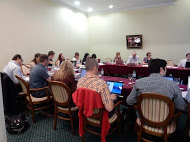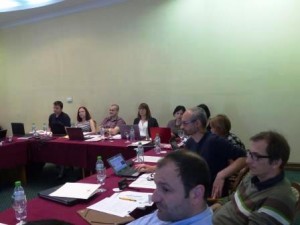Peer Learning Workshop on Data Management, 20th of May, Plovdiv
The peer Learning workshop co-organised by IRE-Liguria and EAP Plovdiv provided concrete examples and testimonies from experienced partners. The workshop provides concrete examples and testimonies from experienced partners, it highlights success factors and transferability conditions, it provides indications about the tools and available methodologies , it allows learning partners to share their needs and concerns as well as recommend subjects to be further discussed during follow-up sessions which will be organized through ENERGee-WATCH network or bilateral discussions with experienced partners. During the peer learning workshop, each project partner involved in the creation of a new observatory will have the opportunity to present and discuss its own preliminary implementation plans during a practical review exercise with other partners.
Summary of the Day
Plovdiv, on the 20th of May
Introduction of the day – Patrick Biard, Rhônalpénergie-Environnement
Learn from the best: Best practice examples for data management from existing regional energy and climate inventory Tools
Opening the discussion: Overview of data management approaches by the D4A Project Partners, Data management tools and types of energy data required for SEAPs (BEI/MEI) – Pierrick Yalamas, Rhônalpénergie-Environnement
Different types of energy data sources and data management methodologies– Álvaro Pérez de Laborda – EVE
- real data collection (from data providers: top-down, from municipality: bottom-up,..)
- estimated data (extrapolation of National data: top-down, surveys: bottom-up, ..)
- modelized data (calculation models)
Best practice from European régions & concrete case studies focusing on issues such as the way you collect the data, the way you check data accuracy, the way you process data
Real energy data collection from municipalities:
- Silvio De Nigris – Città Metropolitana di Torino
- Silvia Moggia & Silvia Bovio – IRE Liguria
Best practice from European regions
- Real energy data collection from distribution network operator: Suzanne Peyraud/Julien Dumont – Nord-Pas de Calais Region/CERDD,
- Estimated data (extrapolation of National data: top-down): Sophie Forsberg – NENET
- Modelized data (calculated data): Etienne Vienot – Rhônalpénergie-Environnement
“Speed peer learning sessions” for personal exchange between experienced partners and partner involved in the creation of a new observatory Experienced partners from previous sessions (1-4) to create small “exhibition stands”. They will also be supported by other experienced partners. Learning partners visit them and discuss their needs and concrete questions.
[slideshow_deploy id=’2964′]
New opportunities in energy data management:
Plenary workshop 1 – How air quality monitoring can help with the processing of GHG emissions data?
- Introduction and moderation: Pierrick Yalamas – Rhônalpénergie-Environnement
- Roundtable discussions with input from experienced partners on this topic: EAZK, EAP, IHOBE
Plenary workshop 2 – How to calculate Indirect GHG emissions?
- Introduction and moderation: Suzanne Peyraud/Julien Dumont – Nord-Pas de Calais Region/CERDD
- Roundtable discussions with input from experienced partners from Rhônalpénergie-Environnement, IRE Liguria, …
Conclusions: Shaping recommendations for partners developing regional inventory tools: Feedback from the speed learning sessions


